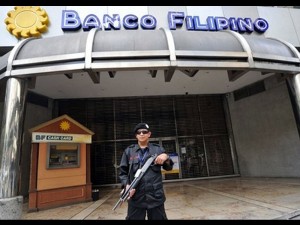The Court of Appeals on Wednesday ordered the Bangko Sentral ng Pilipinas to reopen Banco Filipino (BF) Savings and Mortgage Bank and to extend to it within 30 days state financial assistance worth more than P25 billion.
The appellate court’s former Special 14th Division ruled that respondents BSP, Monetary Board (MB) and the Philippine Deposit Insurance Corp. (PDIC) committed grave abuse of discretion and violated BF’s right to due process when they implemented MB Resolution 372-A on March 17, 2011 which placed the bank under receivership and barred it from continuing its business operations in the country due to “unsound banking practices.”
“The BSP and the MB are hereby ordered to reopen Banco Filipino Savings and Mortgage Bank and allow it to resume business in the Philippines under the comptrollership of the BSP and the MB, complete with viable rehabilitation plan, in order to ensure fast and immediate recovery of the bank from the ill-effects of the illegal closure,” read the decision, penned by Justice Agnes Reyes-Carpio.
Unanimous decision
Concurring with the ruling were justices Vicente Veloso and Normandie Pizarro.
The court directed the BSP and MB to extend financial support to BF by putting up a special liquidity fund equivalent to its deposit base amount or more to enable it to service expected heavy withdrawals when it reopens. A BSP comptroller should be appointed to oversee the use of the fund, it said.
“The challenge is for this court to give a clear and particular direction to the reopening and reorganization of BF, with the objective that it be restored in such a state that it can continue with its business with safety and confidence to its creditors, depositors and the general public and at the same time preventing a repetition of this case the third time around,” it said.
BF stockholders had gone to the appellate court questioning the legality of the BSP’s order to close the bank in March 2011, and placed it under the receivership of state-run Philippine Deposit Insurance Corp. (PDOC), saying its liabilities topped its assets by P8.4 billion.
Insufficient assets
The BSP’s policy-setting MB, in its Resolution 372-A, supported the findings of its Integrated Supervision Department II that the BF was unable to pay its liabilities as they become due, had insufficient realizable assets to meet its liabilities and could not continue in business without involving probable losses to its depositors and creditors.
The MB also barred BF from continuing its operations and placed its assets and affairs under receivership.
BF stockholders, in their petition, insisted that BF did not have a negative net asset value and that its total assets exceeded its liabilities by around P25 billion.
They noted that the total appraised value of the bank’s real properties amounted to P37.89 billion and that its deposit liabilities only amounted to P19.40 billion.
In yesterday’s decision, the appellate court held that the bank would not have been declared insolvent and ineligible for an emergency loan had the MB exercised caution.
The appellate court noted that before the bank’s closure, the business plan agreed by the BSP, MB and BF which provided for the grant of a P25-billion emergency loan, was already up for approval.
No advance notice
The court also gave credence to the appraisal report prepared by the Saromo Realty, Appraisal and Consultancy Firm in compliance with the directive of the House of Representatives committee on banks and financial intermediaries contradicting the MB’s findings that BF was already insolvent.
It noted that one of the MB’s members, lawyer Nelly Favis-Villafuerte, even asked for a reconsideration of the decision to declare BF insolvent considering that the bank was not given advance notice of findings nor sufficient time to refute them.
“As proven in this case, haste makes waste. Had respondents BSP and MB exercised due diligence, depositors and creditors would have been spared from the agony and the nightmare this case had caused. They would not have experienced sleepless nights and serious anxieties,” the appellate court said.
The appellate court also gave credence to BF’s claim that it could not have committed unsound banking practices considering that it was practically co-managed by the BSP through the latter’s assigned comptroller.
